 We recommend that you keep your distance—from the movie. 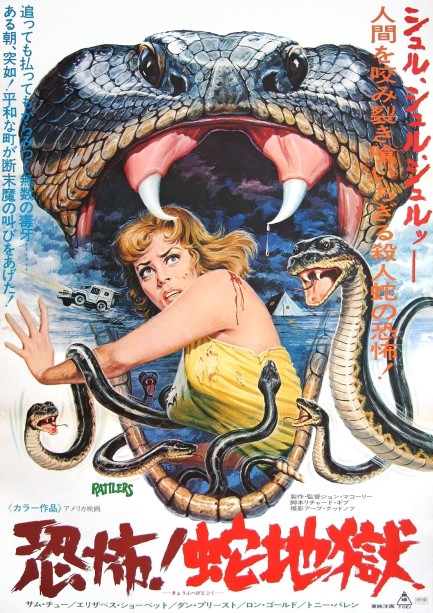
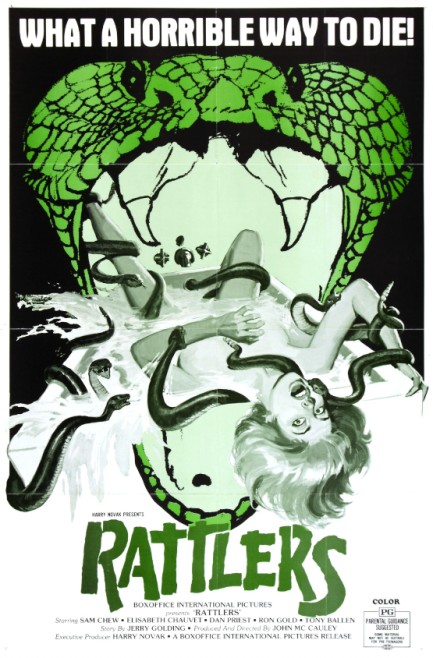 Japanese posters for U.S. film productions are sometimes so good we forget that the movies might not be. Case in point: the above poster was painted by the famed Japanese artist Seito, who was behind promos for films like Star Wars and Flesh Gordon. He produced this for the horror movie Rattlers, which premiered in the U.S. today in 1976 and reached Japan on an indeterminate date sometime afterward. The Japanese title is to the point:恐怖!蛇地獄means “Horror! Snake Hell.” The movie is its own special hell. It's about a bunch of rattlesnakes that run wild, and it's sssssssssssssssso bad. University of California herpetologist Sam Chew figures out how to deal with the offending reptiles, with the help of intrepid reporter Elisabet Chauvet, but nobody figured out how to deal with a bad script, a weak director, and a zero-charisma lead. You can let this one slide. Japanese posters for U.S. film productions are sometimes so good we forget that the movies might not be. Case in point: the above poster was painted by the famed Japanese artist Seito, who was behind promos for films like Star Wars and Flesh Gordon. He produced this for the horror movie Rattlers, which premiered in the U.S. today in 1976 and reached Japan on an indeterminate date sometime afterward. The Japanese title is to the point:恐怖!蛇地獄means “Horror! Snake Hell.” The movie is its own special hell. It's about a bunch of rattlesnakes that run wild, and it's sssssssssssssssso bad. University of California herpetologist Sam Chew figures out how to deal with the offending reptiles, with the help of intrepid reporter Elisabet Chauvet, but nobody figured out how to deal with a bad script, a weak director, and a zero-charisma lead. You can let this one slide.
 Oshida makes her mark and it looks like a swastika. 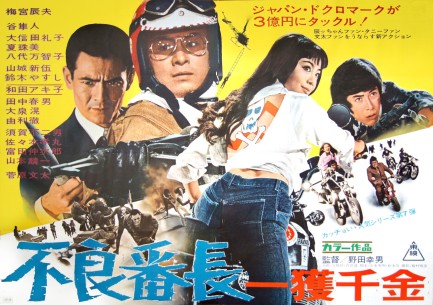
Above is a bo-ekibari style poster for the pinky violence actioner Furyô banchô: Ikkaku senkin, aka Wolves of the City: Fast Money. This piece is cousin to the standard sheet for the film we shared a couple of years ago. Just as when we showed you that one we haven't located the movie yet, but we'll keep working on it, if only to find out why star Reiko Oshida has a swastika on her back. We're guessing she's in a motorcycle gang, and it's their emblem. Furyô banchô: Ikkaku senkin premiered today in 1970. You can see the other poster here, and that entry also discusses briefly the swastika symbol in Japanese culture.
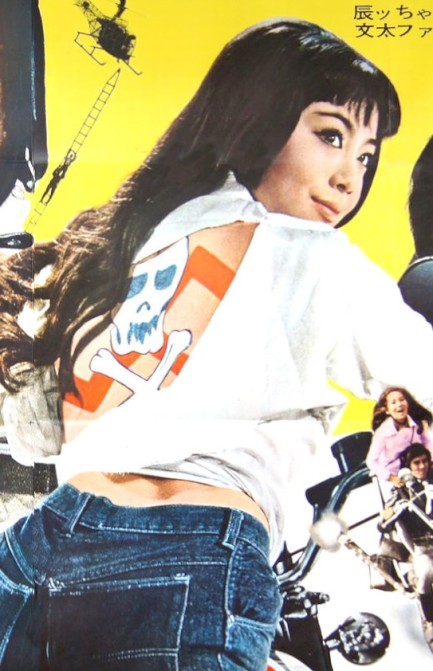
 Three times the danger, three times the fun. 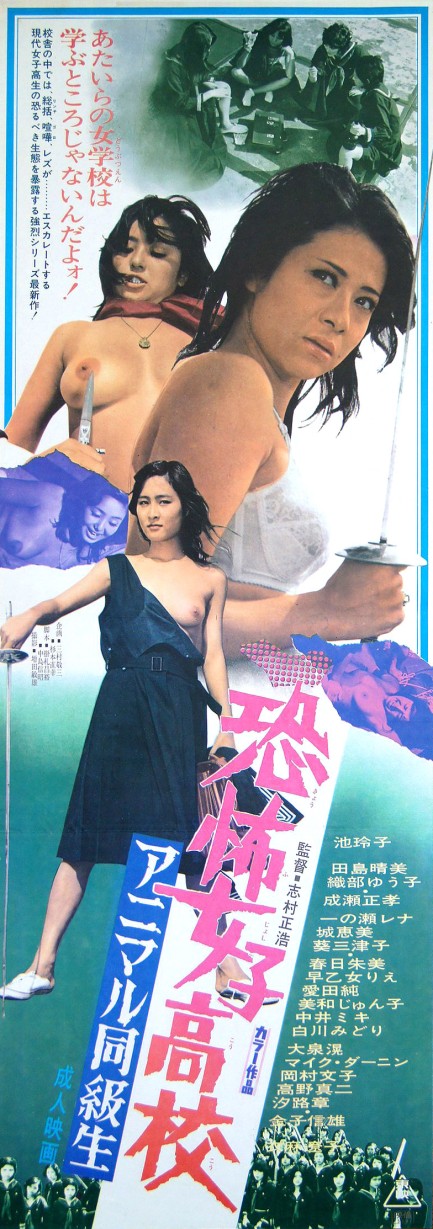
We talked about Reiko Ike's 1974 pinky violence flick Kyôfu joshi kôkô: Animal dôkyôsei—known in English as Terrifying Girls High School: Animal Courage—a long while ago, but we wanted to highlight this rare promo in tateken format. You can see the original poster and learn a bit about the film here.
 Oshida and her friends run riot in the capital. 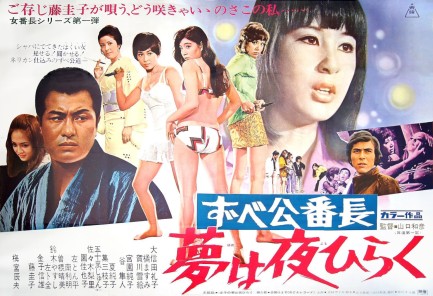 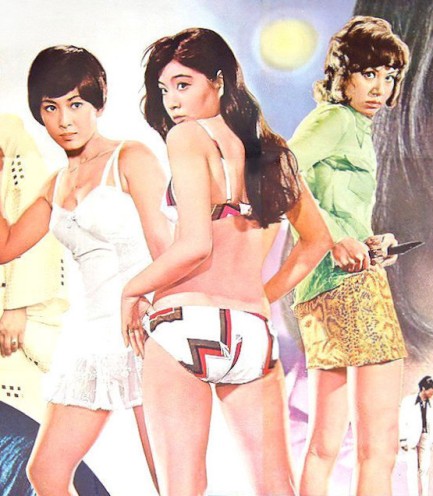
We're sticking with Japanese posters today. Here's one for the 1970 pinky violence flick Zubekô banchô: yume wa yoru hiraku, aka Tokyo Bad Girls, aka Delinquent Girl Boss: Blossoming Night Dreams. We showed you two other promos for this film, which were the standard and always fun tateken sizes. This is a rare bo-ekibari.
 This flower is toxic—to thieves and killers. 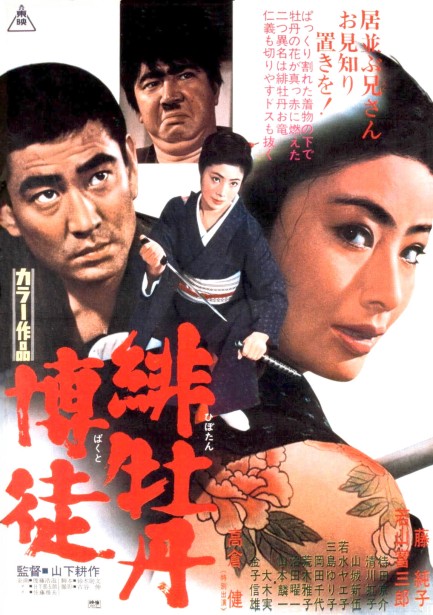
We've been on a movie binge, so we have one to discuss for the third day in a row. Above is a poster for the 1968 action-drama Hibotan bakuto, aka Red Peony Gambler. It's fair to call the film a classic. It was directed by the legendary Norifumi Suzuki, and starred Junko Fuji and Ken Takakura. Fuji plays a wandering gambler seeking retribution for her father, who was murdered by an unknown bandit. The killer left behind one clue—a distinctive cloth wallet that Fuji now carries with her. Ultimately she finds her father's killer. No surprise there—that's the entire point. But revenge, unsurprisingly, is more complicated than she'd imagined.
When a movie spawns multiple sequels it's a safe bet it's good, and this one had seven follow-ups. Hibotan bakuto has nearly everything you want from a sword opera. The choreographed action, while not fully convincing, is fun. The direction and cinematography are excellent. And Fuji crafts an interesting performance, staring unblinkingly into the middle distance, looking grim, exuding a compelling coolness and self-containment. Overall, we found the movie very worthwhile. We'll check out at least one or two of the sequels and report back. Hibotan bakuto premiered in Japan today in 1968.
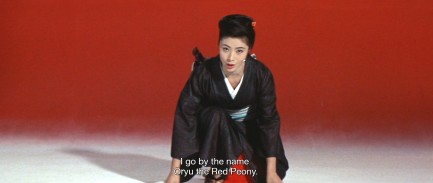 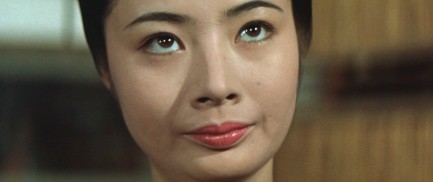 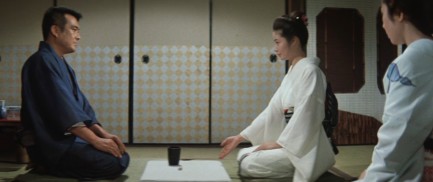 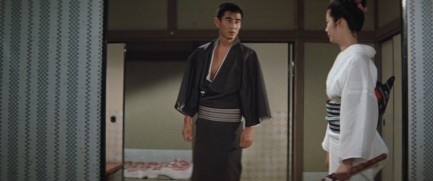 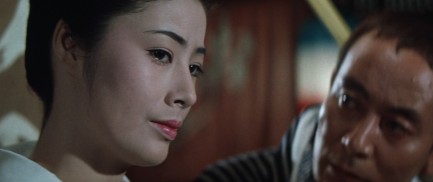 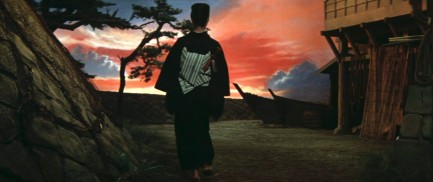
 Zero to crazy in under ninety minutes. 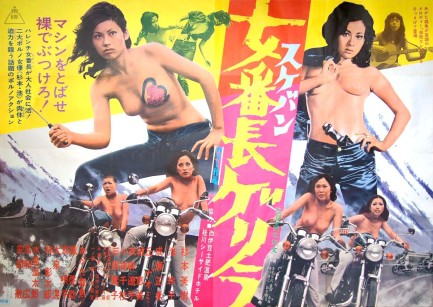
We first shared a poster for the pinky violence movie Sukeban gerira, aka Girl Boss Guerrilla, years ago and said at that time we'd get around to talking about the movie. We subsequently shared a tateken style poster, but still didn't get around to the film itself. Well, it's finally later. Eleven years later, to be exact. We refreshed our memory with a new screening last night, and to accompany today's thoughts we're sharing a rare bo-ekibari style poster of this classic pinky violence actioner from Toei Company.
Miki Sugimoto and three friends, who comprise the small but spirited Red Helmet Motorcycle Gang, take a trip from Tokyo to Kyoto to see if they can hustle up some yen by whatever means they can manage—grifts, graft, blackmail, whatever. They make some cash but quickly run afoul of Ryôko Ema of the Kyogoku Group, head boss of all Kyoto's girl gangs, which leads to a Ryôko-Miki showdown for control of the city. Our advice: never fight in flip-flops. But then again, we're not as tough as Miki. She loses her flip flops, but wins the fight.
There's always a set of bad men in the background of a pinky violence movie, and it turns out that though Kyoto's girl gangsters are now under Miki's hard won control, all operate under the umbrella of the Tsutsui Gang, who are basically the Kyoto branch of the yakuza. Miki has to give regular tribute to the boys, obey the rules, or pay the price. She's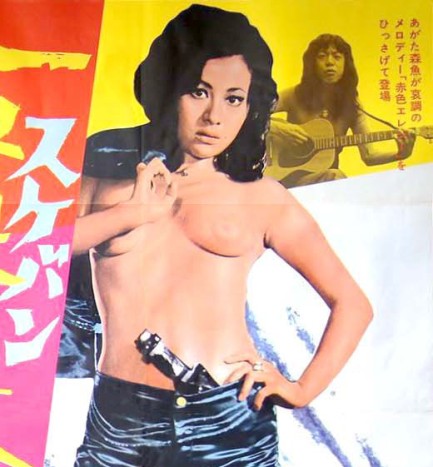 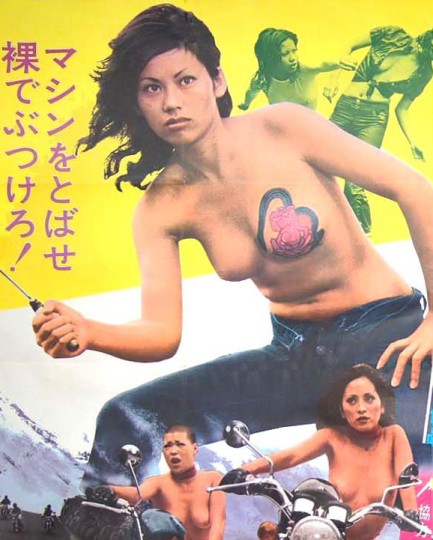 willing to toe the line, but her situation is quickly complicated when she makes a new pal played by Reiko Ike, who's disinclined to obey anybody, but particularly the local yakuza clan, one of whose higher ups is her big brother. willing to toe the line, but her situation is quickly complicated when she makes a new pal played by Reiko Ike, who's disinclined to obey anybody, but particularly the local yakuza clan, one of whose higher ups is her big brother.
Along the way to settling this mess you get fights, captures, torture, and nudity. Comedy and romance are part of the equation too, as is a bit of social commentary (a Red Helmet girl picking up gonorrhea from a priest is particularly biting). In the end a final throwdown is inevitable but how it turns out is anyone's guess. Nothing is guaranteed in a pinky violence movie—well, except violence.
Pinky violence movies can be fun, but the misses tend to be well wide of the mark, if not psychologically disturbing. Sukeban gerira is a nice example of the genre. It's wild, but never quite to the extent that it makes you want to run from the room. An excellent moment comes just a few minutes in, when Sugimoto aggressively bares a tattooed breast at a set of macho assholes, causing them to physically recoil. That sums up the best pinky violence: a new brand of feminine power that overcame any opposition set against it. Sukeban gerira premiered today in 1972.
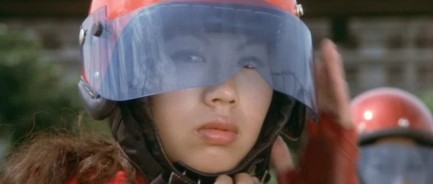 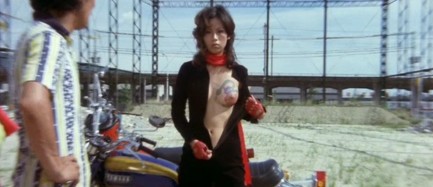 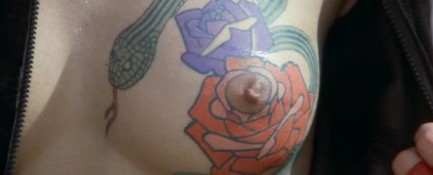 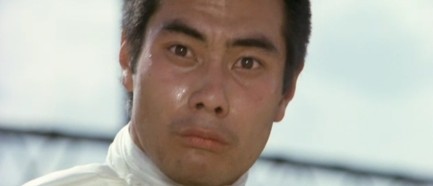 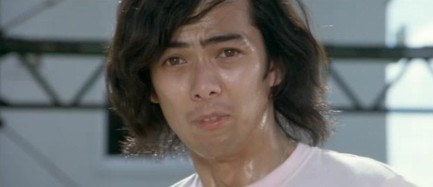 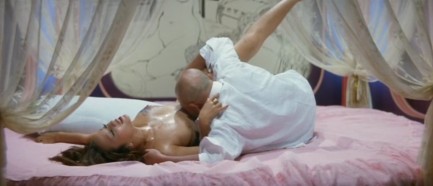 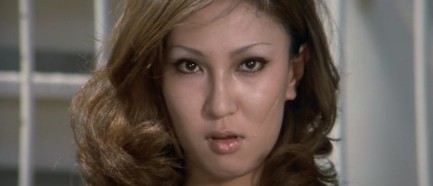 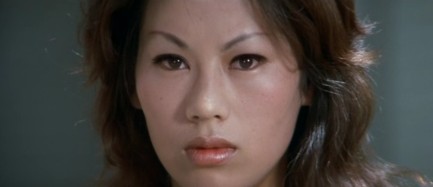 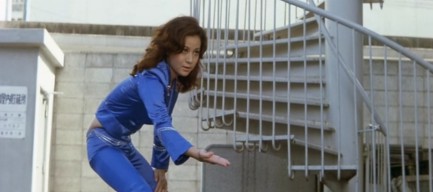 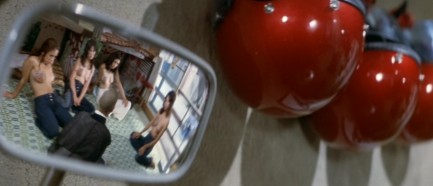 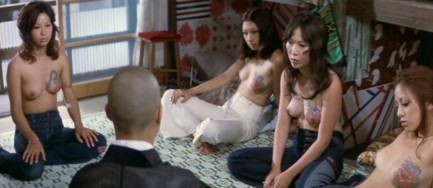 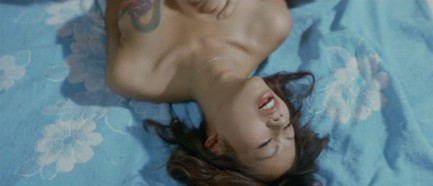 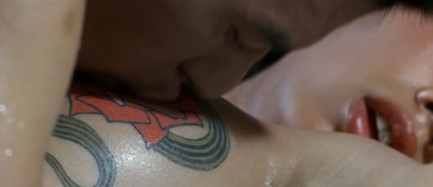 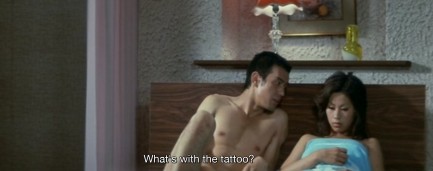 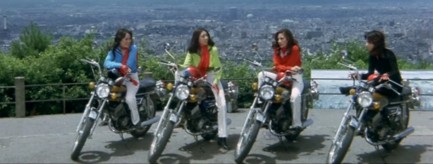 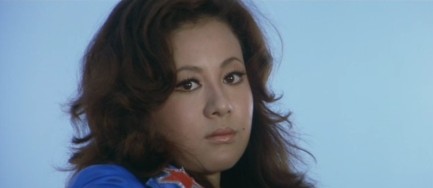  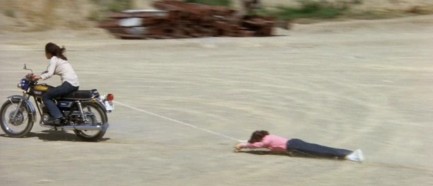 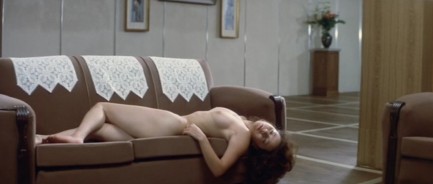 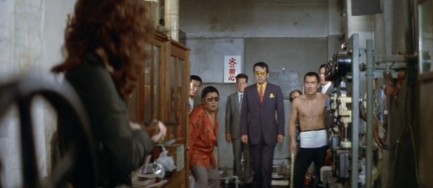 
 They're a hell of a lot of trouble. 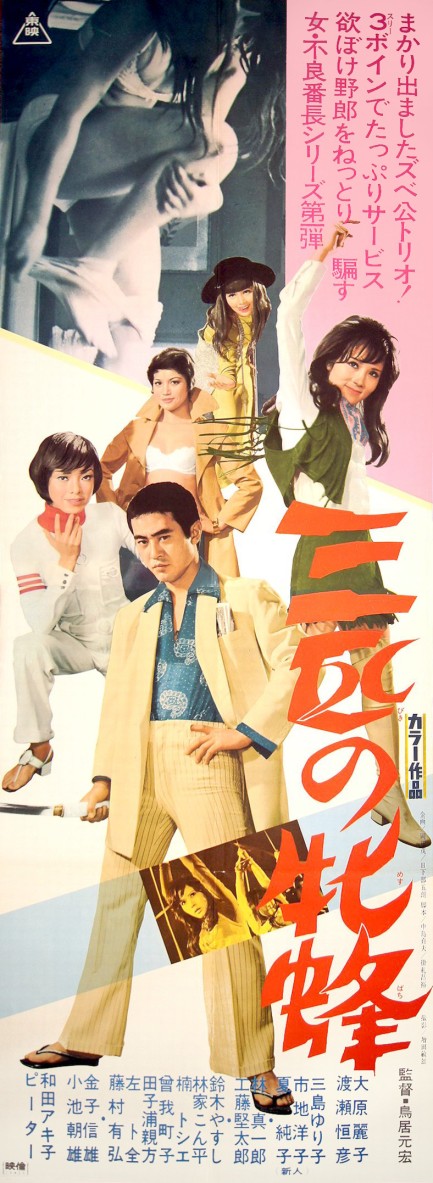
Above: an alternate poster in tateken format for a movie we highlighted last year—Sanbiki no mesubachi, aka Three Pretty Devils. It starred Reiko Ohara, Junko Natsu, and Yoko Ichiji, and preimiered in Japan today in 1970. See what we wrote about it here.
 She's someone you really don't want to cross. 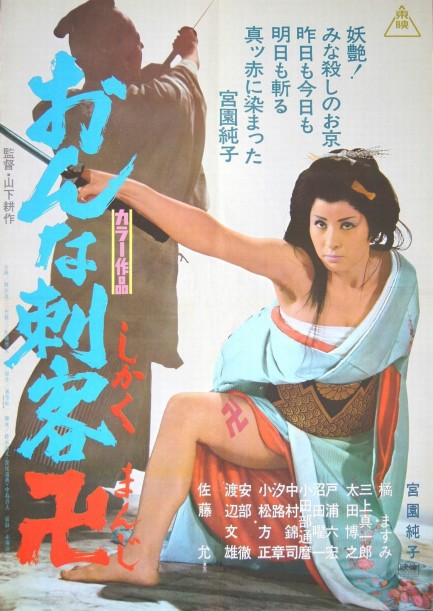 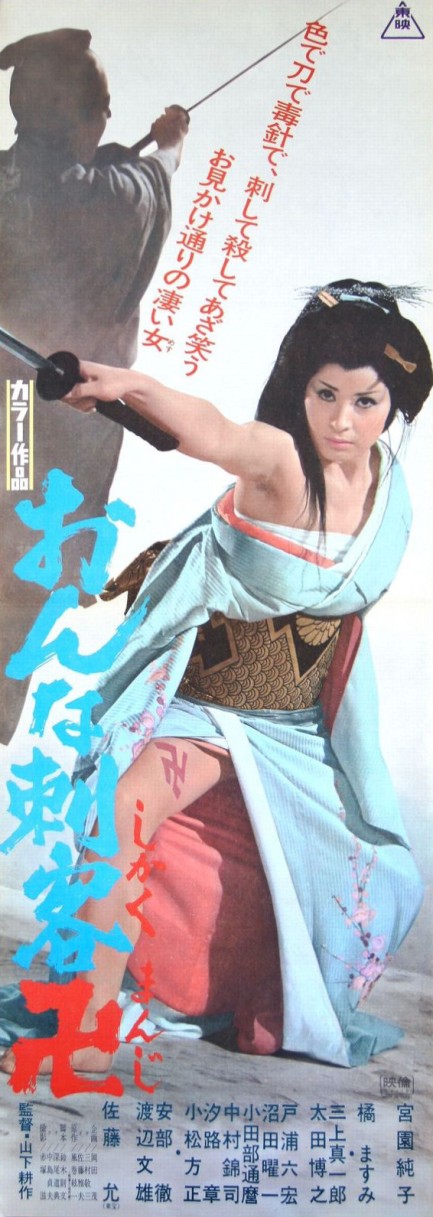
Above: two excellent posters for Onna shikaku manji, aka Mankiller, aka Eternal Killer Woman, which premiered today in 1969 starring Junko Miyazuno. You notice the swastika-looking graphic and the simlar tattoo on Junko's thigh? It's actually a symbol that predates Adolf and the Hitlerians, as we explained a while back at this post. We've had these posters for several years but had no luck finding the movie, so we finally gave up and decided to just upload the art. We think it's worth sharing even without info about the film, and hopefully you think so too.
 We deal in human slaughter. But when the killing business is slow we also hire out to open Champagne bottles at parties. 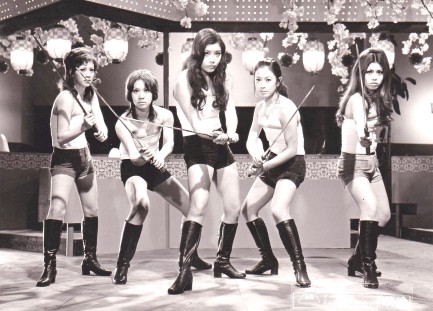 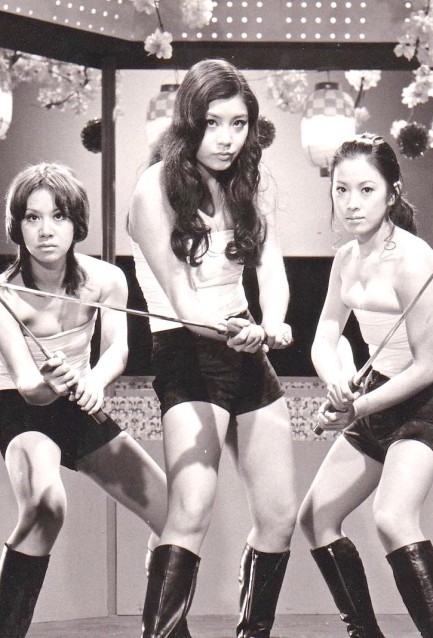
We ran across this menacing promo image online showing the titular quintet of delinquent girl bosses from Delinquent Girl Boss: Worthless To Confess, originally titled Zubekô banchô: zange no neuchi mo nai, and which premiered in Japan today in 1971. Reiko Oshida is front and center, flanked by Yukie Kagawa, Mieko Tsudoi, Masumi Tachibana, and Yumiko Katayama. We've shared plenty of promo art from the film, and discussed what it's about. You can see all that by clicking its keywords below. And if you get the urge to be trendy and open a Champagne bottle with a sword, try to do better than these people.
 Black don't crack a smile. 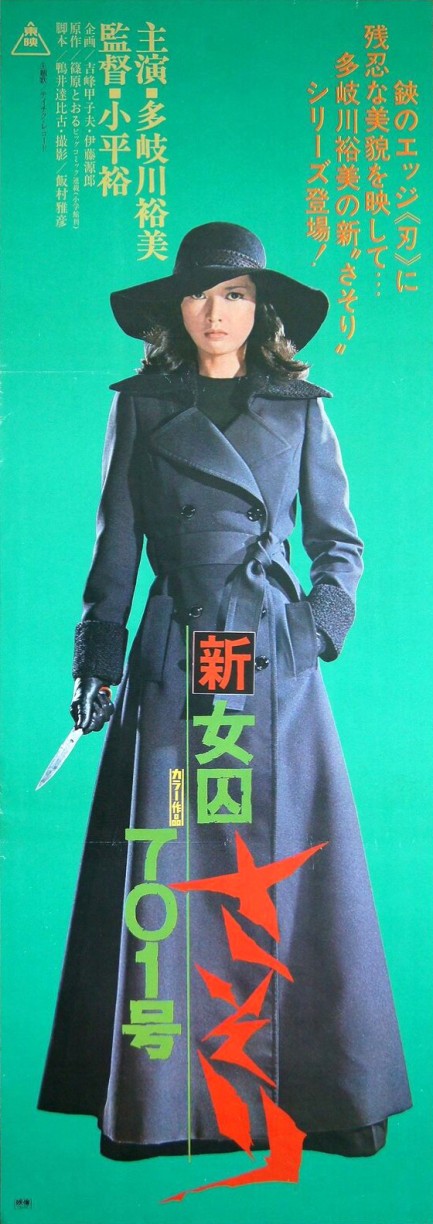
Above is a second excellent tateken poster for Shin joshuu sasori: 701-gô, known in English as New Female Prisoner Scorpion: 701, with Yumi Takigawa dressed in black from head to toe and looking ready to deal out death. These tateken style promos are rare, so we're happy to have found two. As usual, we like to share posters on a film's premiere date, and that was today in 1976.

|
 |

The headlines that mattered yesteryear.
2003—Hope Dies
Film legend Bob Hope dies of pneumonia two months after celebrating his 100th birthday. 1945—Churchill Given the Sack
In spite of admiring Winston Churchill as a great wartime leader, Britons elect
Clement Attlee the nation's new prime minister in a sweeping victory for the Labour Party over the Conservatives. 1952—Evita Peron Dies
Eva Duarte de Peron, aka Evita, wife of the president of the Argentine Republic, dies from cancer at age 33. Evita had brought the working classes into a position of political power never witnessed before, but was hated by the nation's powerful military class. She is lain to rest in Milan, Italy in a secret grave under a nun's name, but is eventually returned to Argentina for reburial beside her husband in 1974. 1943—Mussolini Calls It Quits
Italian dictator Benito Mussolini steps down as head of the armed forces and the government. It soon becomes clear that Il Duce did not relinquish power voluntarily, but was forced to resign after former Fascist colleagues turned against him. He is later installed by Germany as leader of the Italian Social Republic in the north of the country, but is killed by partisans in 1945.
|

|
|

It's easy. We have an uploader that makes it a snap. Use it to submit your art, text, header, and subhead. Your post can be funny, serious, or anything in between, as long as it's vintage pulp. You'll get a byline and experience the fleeting pride of free authorship. We'll edit your post for typos, but the rest is up to you. Click here to give us your best shot.

|
|


 Japanese posters for U.S. film productions are sometimes so good we forget that the movies might not be. Case in point: the above poster was painted by the famed Japanese artist Seito, who was behind promos for films like Star Wars and Flesh Gordon. He produced this for the horror movie Rattlers, which premiered in the U.S. today in 1976 and reached Japan on an indeterminate date sometime afterward. The Japanese title is to the point:恐怖!蛇地獄means “Horror! Snake Hell.” The movie is its own special hell. It's about a bunch of rattlesnakes that run wild, and it's sssssssssssssssso bad. University of California herpetologist Sam Chew figures out how to deal with the offending reptiles, with the help of intrepid reporter Elisabet Chauvet, but nobody figured out how to deal with a bad script, a weak director, and a zero-charisma lead. You can let this one slide.
Japanese posters for U.S. film productions are sometimes so good we forget that the movies might not be. Case in point: the above poster was painted by the famed Japanese artist Seito, who was behind promos for films like Star Wars and Flesh Gordon. He produced this for the horror movie Rattlers, which premiered in the U.S. today in 1976 and reached Japan on an indeterminate date sometime afterward. The Japanese title is to the point:恐怖!蛇地獄means “Horror! Snake Hell.” The movie is its own special hell. It's about a bunch of rattlesnakes that run wild, and it's sssssssssssssssso bad. University of California herpetologist Sam Chew figures out how to deal with the offending reptiles, with the help of intrepid reporter Elisabet Chauvet, but nobody figured out how to deal with a bad script, a weak director, and a zero-charisma lead. You can let this one slide.


















 willing to toe the line, but her situation is quickly complicated when she makes a new pal played by Reiko Ike, who's disinclined to obey anybody, but particularly the local yakuza clan, one of whose higher ups is her big brother.
willing to toe the line, but her situation is quickly complicated when she makes a new pal played by Reiko Ike, who's disinclined to obey anybody, but particularly the local yakuza clan, one of whose higher ups is her big brother.



































































































